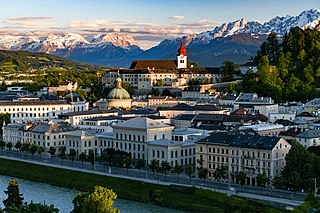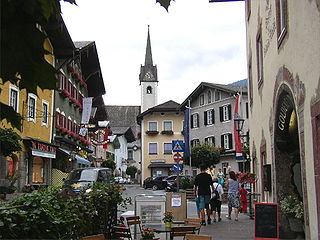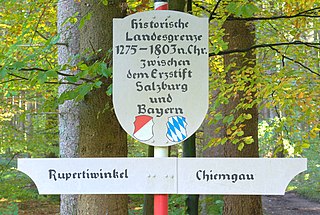
Salzburg is the fourth-largest city in Austria. In 2020, it had a population of 156,872.

Salzburg is an Austrian federal state. In German it is called a Bundesland, a German-to-English dictionary translates that to federal state and the European Commission calls it a province. In German, its official name is Land Salzburg, to distinguish it from its eponymous capital Salzburg. For centuries, it was an independent Prince-Bishopric of the Holy Roman Empire. It borders Germany & Italy.

A Christmas carol is a carol on the theme of Christmas, traditionally sung at Christmas itself or during the surrounding Christmas holiday season. The term noel has sometimes been used, especially for carols of French origin. Christmas carols may be regarded as a subset of the broader category of Christmas music.

Franz Xaver Gruber was an Austrian primary school teacher, church organist and composer in the village of Arnsdorf, who is best known for composing the music to "Stille Nacht".

"Silent Night" is a popular Christmas carol, composed in 1818 by Franz Xaver Gruber to lyrics by Joseph Mohr in Oberndorf bei Salzburg, Austria. It was declared an intangible cultural heritage by UNESCO in 2011. The song was first recorded in 1905 and has remained a popular success, appearing in films and multiple successful recordings, as well as being quoted in other musical compositions. It is the world's most recorded Christmas song, with more than 137,000 known recordings.

The Salzach is a river in Austria and Germany. It is 227 kilometres (141 mi) in length and is a right tributary of the Inn, which eventually joins the Danube. Its drainage basin of 6,829 km2 (2,637 sq mi) comprises large parts of the Northern Limestone and Central Eastern Alps. 83% of its drainage basin lies in Austria, the remainder in Germany (Bavaria). Its largest tributaries are Lammer, Berchtesgadener Ache, Saalach, Sur and Götzinger Achen.
This is a list of music-related events in 1818.

Josephus Franciscus Mohr, sometimes spelled Josef was an Austrian Roman Catholic priest and writer, who wrote the words to the Christmas carol "Silent Night."

Laufen is a town in Berchtesgadener Land district in Bavaria at the Austria–Germany border.

Oberndorf bei Salzburg is a small city in the Austrian state of Salzburg, about 17 km (11 mi) north of the City of Salzburg. It is situated on the river Salzach in the Flachgau district. Town privileges were granted on April 30, 2001.
Bezirk Braunau is a district of the state of Upper Austria in Austria.

Golling an der Salzach is a market town in the Hallein district of Salzburg, Austria.

Kuchl is a market town in the Hallein district of Salzburg, Austria.

Bergheim is a municipality in the district of Salzburg-Umgebung in the state of Salzburg in Austria. The Plainberg with its Maria Plain pilgrimage church forms the border between Bergheim and the city of Salzburg to the south.

Koppl is a municipality in the district of Salzburg-Umgebung in the state of Salzburg in Austria. In the west it borders on the Salzburg urban area.

John Freeman Young, author of the most commonly sung English-language translation of the Christmas carol Silent Night, became the second bishop of Florida in 1867.

The Rupertiwinkel is a small historic region on the southeastern border of Bavaria, Germany. Part of the Archbishopric of Salzburg until the early 19th century, it is named after the first Salzburg bishop Saint Rupert (c.660–710), apostle to the Duchy of Bavaria.

The Silent Night Chapel is located in the town of Oberndorf bei Salzburg in the Austrian province of Salzburg, and is a monument to the Christmas carol "Silent Night", its lyricist Joseph Mohr, and its composer Franz Xaver Gruber. The chapel stands on the site of the former Nikolauskirche, where on 24 December 1818, the Christmas carol was performed for the first time.
Silent Mouse is a British 1988 television film directed and produced by Robin Crichton.

Christmas with Flicka is a 58-minute television concert film starring Frederica von Stade, Melba Moore, Rex Smith and Julius Rudel. It is an American-Austrian co-production, shot on location in Austria in 1987.


















